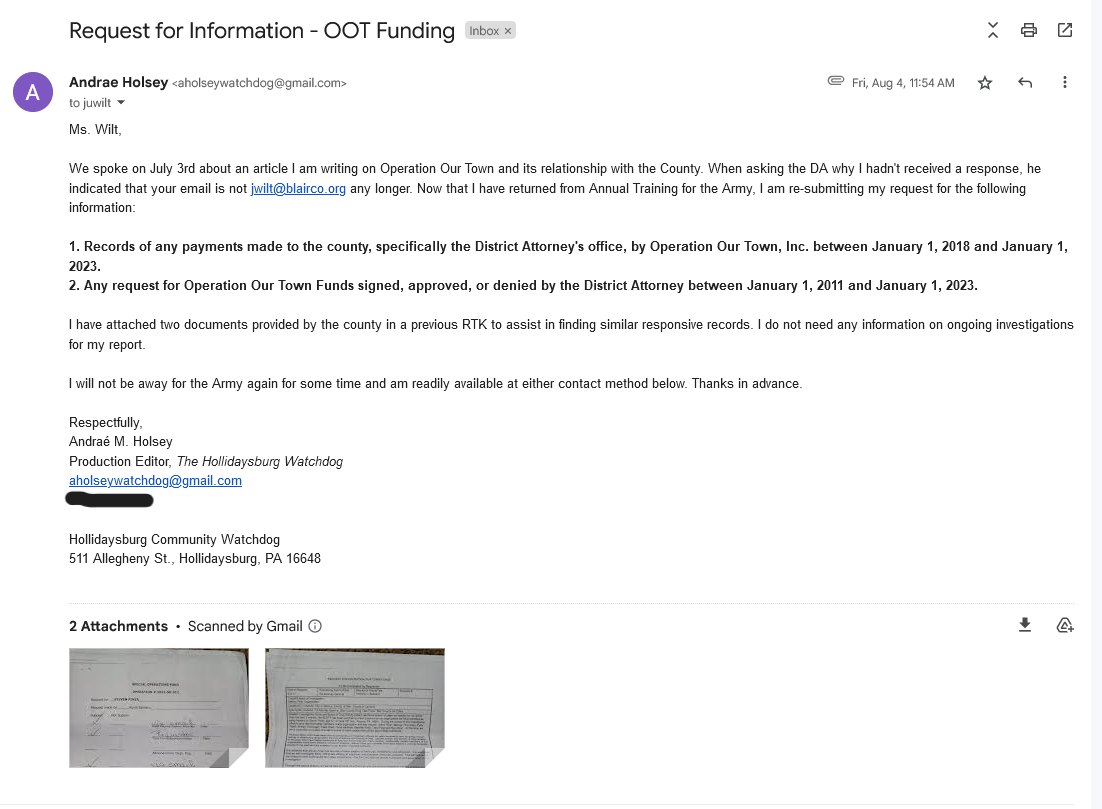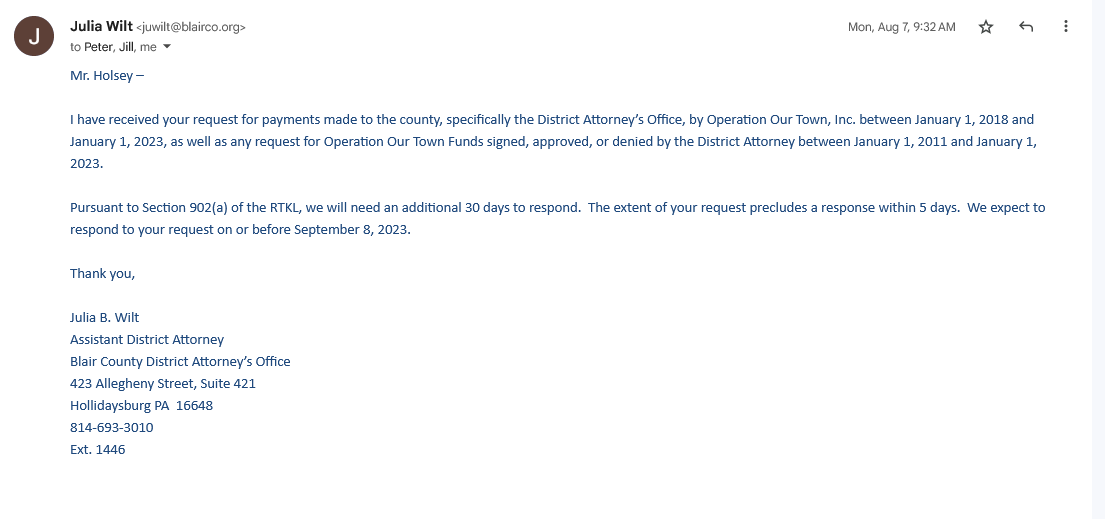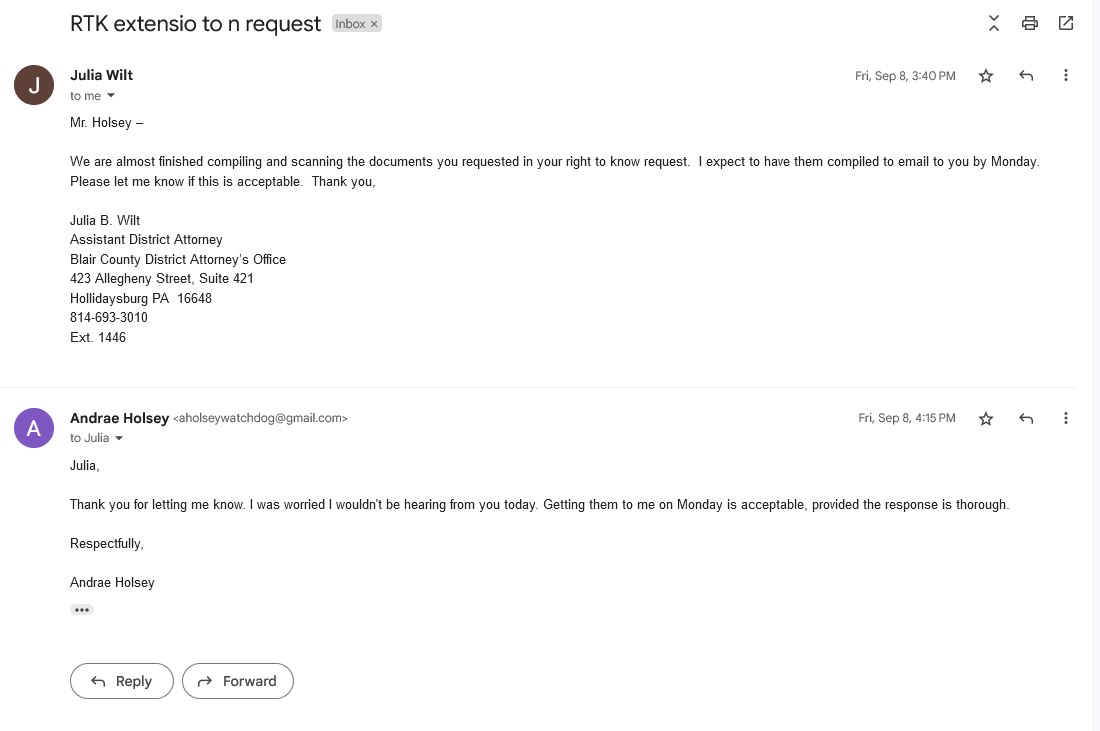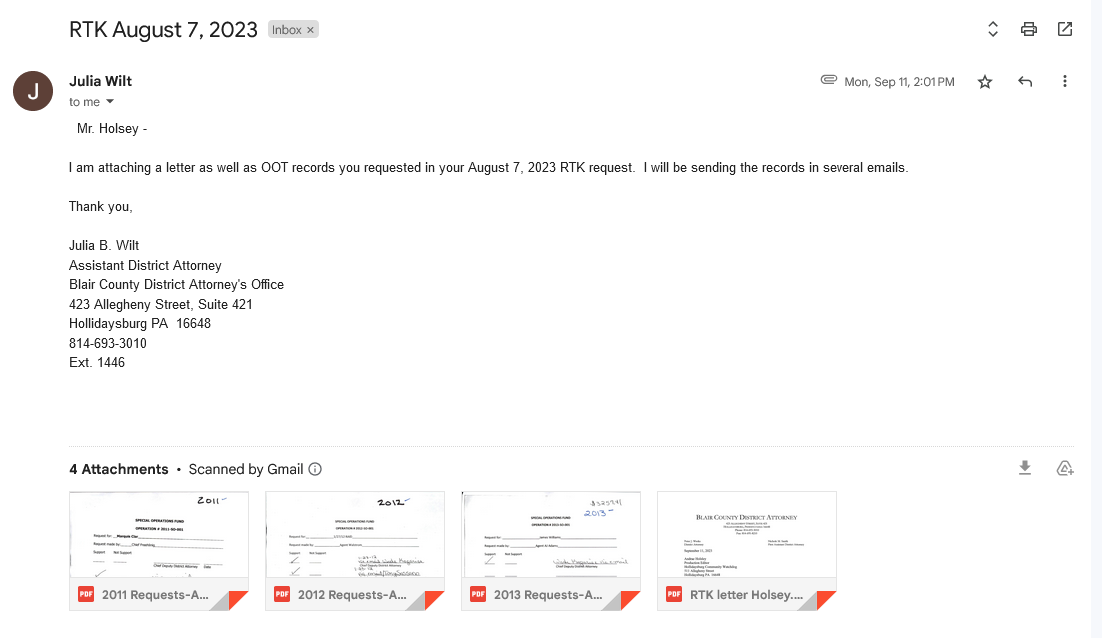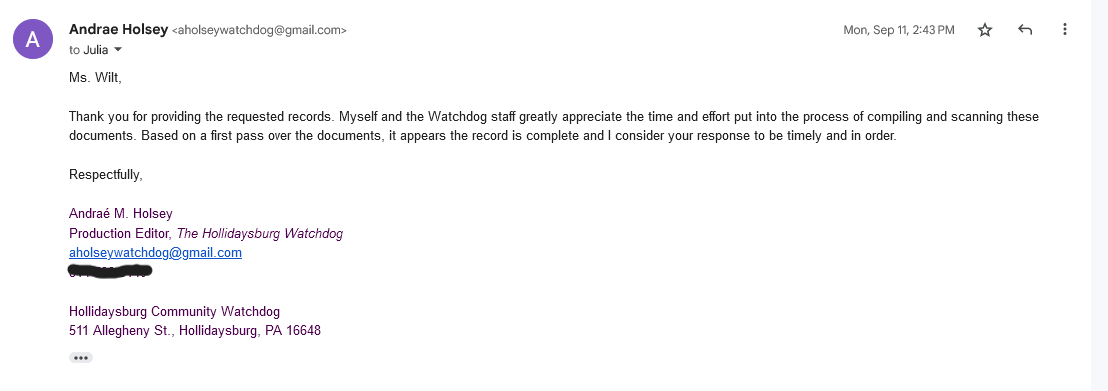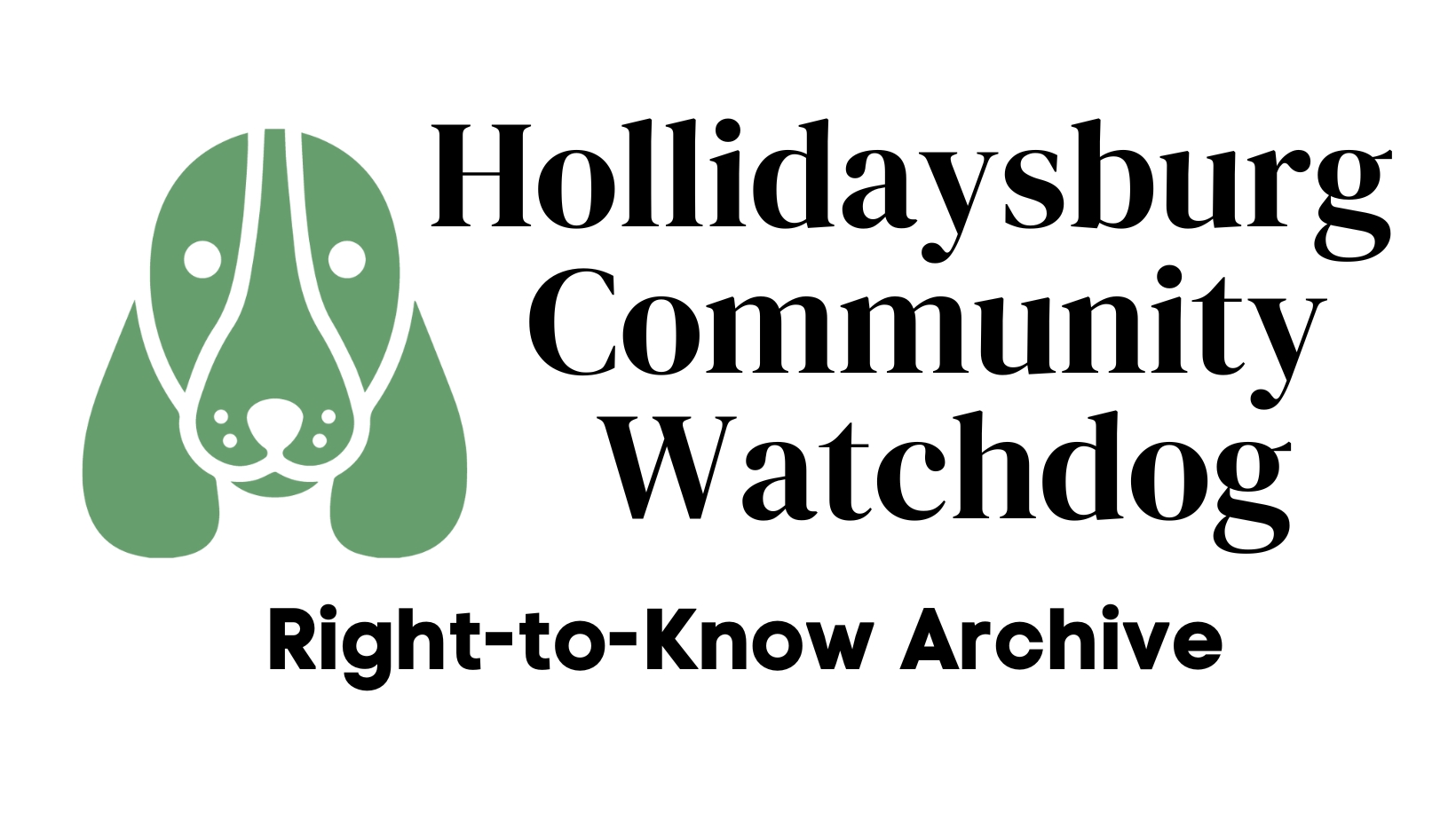
Overview
For many years, local non-profit organization Operation Our Town, Inc. (OOT) has been the subject of debates over what one reporter called a Privately Funded Drug War. Local activists, right and left, have complained for years that private funding of public prosecutions is inherently unfair and prone to abuse. At the same time, local police and a number of community institutions have offered a robust defense for the arrangement, by which OOT has funded both law enforcement operations and drug-related prosecutions that would be otherwise unaffordable for a low-income county like Blair.
OOT spending in the county appears to fall into three broad categories:
- Salary assistance for an assistant district attorney (ADA) specializing in drug prosecutions, and his staff. (When he was still an ADA, current District Attorney Pete Weeks was the county’s lead drug prosecutor.) OOT told the Watchdog that it has not funded ADA salaries since December 2021.
- Law enforcement operations, including confidential informant expenses, drug buys and officer overtime.
- Prevention and education.
The Watchdog monitors government, not the private sector, so we focused our research focused on the first two categories.
Whether or not private money in drug prosecutions is good policy isn’t a Watchdog issue. Watchdog members have widely different opinions on the matter. We do care, however, whether the arrangement is transparent and lawful. After receiving persistent but mostly unsubstantiated complaints about OOT over the years, the Watchdog found itself asking just one question: Is there meaningful oversight to the OOT money provided to the District Attorney’s Office?
Unfortunately, the answer appears to be “not really”. While there’s no evidence of misuse of the funds, there’s insufficient oversight at the County. For years the public has been told that all OOT funding went directly into the general treasury. Although we assume the officials saying this believed this to be the case, it simply wasn’t true — at least not for law enforcement operations. The record shows that OOT money for drug stings flows into an account entirely separate from the general treasury, meaning it is outside the purview of the treasurer (Jim Carothers), the controller (A.C. Stickel) and the County’s auditing firm (Zelenkofske Axelrod, LLC ). Indeed, when we asked them about the account, they knew nothing about it.
This is problematic. While there is nothing in state law that prohibits OOT from funding the DA’s office — and nothing to prevent the DA from using those funds as he sees fit — spending anything from an unaudited account does appear to be unlawful:
- Title 16 Section 1403. Expenses Incurred by District Attorney.–All necessary expenses incurred by the district attorney or the district attorney’s assistants or any officer directed by the district attorney in the investigation of crime and the apprehension and prosecution of persons charged with or suspected of the commission of crime, upon approval thereof by the district attorney and the court, shall be paid by the county from the general funds of the county.
Initial interviews with county officials
In June of 2023, the Watchdog began looking for more clarity on the financial relationship between OOT and the Blair County DA. We knew from public announcements that OOT funded both law enforcement activities and the salaries of a drug crime prosecutor and staff in the DA’s office. But it was entirely unclear how the money was tracked.
We first examined the non-profit IRS tax filings of OOT and its “Annual Report”, which is really more of a newsletter. When numbers couldn’t be matched between these documents and the County’s posted records, we began asking officials if there was something missing in their reports.
We spoke to Treasurer Carothers, responsible for reconciling the County’s bank statements. He told the Watchdog that any money received by the county from OOT should appear on the General Fund checking account. OOT payments should “just show up as general line items,” he said. When asked who would be able to identify these OOT line items in the county ledger, he indicated that Controller Stickel might be able to help.
In an interview with Stickel the same day, the Controller shed a little light on what was happening. “OOT has contributed money to the County used to pay for things. However, there’s not a fund and there’s not a line item.” He too, however, thought all the OOT money was going into the general treasury. Until December 2021, a portion of OOT funding went to supplement salaries in the District Attorney’s office. Stickel’s office, he said, would send OOT notice informing it of the cost of salary positions .
Request & Exchange with Julia Wilt, Open Records Officer, Blair County Office of the District Attorney
In a departure from our usual practice, the Watchdog did not send the DA’s office a formal right-to-know request under the RTK law. Our organization has a good relationship with the current DA. Sending an informal request was intended as a show of good faith, as we would have no right of appeal to the Office of Open Records if the DA’s office failed to comply.
To its credit, the office’s response was formal and timely. We don’t believe the response was complete — absent was the assistant DA salary supplementation over the past 12 years paid by OOT, which we obtained in any case — but it did appear to be a good-faith effort to respond.
What the DA did provide to us were 12 years of financials of OOT-supported law enforcement operations. We saw incoming checks from OOT, signed by president and founder Michael Fiore, as shown below. We could also see how the money was spent on things like confidential informant (CI) payments, undercover drug purchases and police officer overtime. Nothing inappropriate here — we knew beforehand this was how some of the money was being used. Both OOT and the DA’s Office have been explicitly clear that the private funding would directly support sting operations.
What we didn’t know is that the OOT money for drug stings flows into an account that appears nowhere in the County audit — First National Bank account number 0011275588. When asked, Blair County Treasurer Jim Carothers and County Controller AC Stickel told us they had no idea this account even existed. We then contacted the county auditor, accounting firm Zelenkofske Axelrod, LLC, which told us that no account with that number was included in its 2022 audit of county finances.
In a follow-up call to Stickel on September 13, 2023, we asked him if he had any knowledge of the FNB account ending in 5588. Stickel noted that the “account is not in the general ledger.” He followed up for us with First National Bank and confirmed that “an account with that number is not registered with any County Employee ID.”
The Watchdog called the auditing company again, wondering if the mystery account might actually be the same account that receives the proceeds from civil forfeiture assets seized by the police during drug raids. Every District Attorney in the state controls enjoys full discretion over such accounts, which are by law (Title 42 §6801) subject to local audit but are exempt from public disclosure. The auditor confirmed that FNB account ending in 5558 was not the civil forfeiture account.
That means the account has been managed without oversight from any county finance officer.
Private citizen request
Coincidentally, and unbeknownst the Watchdog, a private citizen submitted an RTK request to the DA’s office around the same time. His request specified no dates, but the DA’s office nonetheless endeavored to comply. The individual shared the DA’s response to his request with us. Ironically, it did include the detailed salary supplementation that was not released in the Watchdog response. (Perhaps the DA’s office thought we were working together with the private citizen. We weren’t.)
According to the citizen, the DA’s office indicated that they did not have records of the “amount Operation Our Town has given the DA’s office that was specifically earmarked for the pay of an assistant DA.” The office had to contact OOT to ask for the records, which were ultimately provided to the requester.
The records provided to the citizen appear to show that the OOT money earmarked for a drug prosecutor and staff was deposited into the general treasury, as is proper.
Conclusions
- The DA’s Office was responsive to citizen requests for information.
- There’s no evidence that the OOT money has been misused, or that OOT has directed specific enforcement or prosecution efforts at the DA’s office.
- OOT’s tax returns do not clearly distinguish spending on salaries, enforcement and prevention, making it impossible to compare the DA spending records with the OOT’s donation records.
- The OOT money for ADA and staff salaries is properly channeled through the general treasury.
- The OOT money for drug enforcement operations is flowing through an unaudited account that the treasurer, the controller and the county auditor have never seen or scrutinized. We aren’t lawyers, but we think this is probably unlawful.
The Watchdog Request
Private Citizen Request
2018-22 Payments from OOT to DA
2011-22 Requests & Approvals


